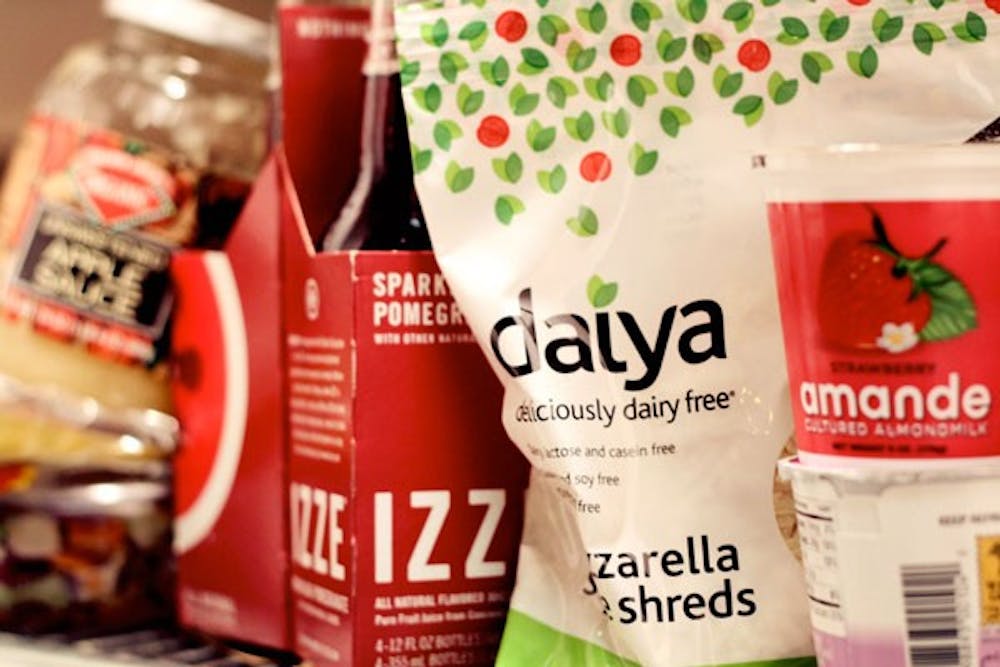It’s dinnertime on a Monday night and Marta Vitolins is in the cozy kitchen in her apartment at Scheidler Apartment complex. She munches on pomegranate seeds as she gathers pots and pans. There are papers, textbooks and DVDs scattered throughout the living room and a cell phone beeps on the kitchen table; typical marks of a college student’s home. Incense burns on a bookshelf and Iron & Wine plays on the stereo. Vitolins is graceful as she rummages through her cabinets and fridge, collecting the ingredients needed to make tonight’s recipe: quinoa and Italian sausage-stuffed twice-baked potatoes. She came up with the dish herself and hasn’t yet tested the recipe.
“It just sounds good, I think,” she comments. “Hopefully it’s delicious!”
The ingredients included in the dish are all approved as part of her diet, a diet that includes things like dairy-free yogurt and soda with no added preservatives. In December, Vitolins started a gluten-free eating regimen that excludes some of her favorite things—like beer—but supports a healthy immune system and gives her the energy it takes to tackle her busy schedule.
She had noticed the signs for a while. Lights seemed brighter and sounds seemed louder to her than other people. She never felt one hundred percent but she chalked it up to stress and not enough sleep. After all, she goes nonstop. As a classical studies major who loves to stay busy, her schedule is packed. But the symptoms persisted and she started to think that maybe it wasn’t just exhaustion.
After researching on her own, Vitolins came to the conclusion that the food she was eating was causing her symptoms. The research she found suggested that the amount of gluten in her diet was causing her to feel tired, sluggish and made her senses extra-accute, making it hard to focus. According to allergy-details.com, one in 30 adults has a gluten allergy, making it a common occurrence in today’s world. Some people are required to go gluten-free because they have a disease known as Celiac Disease, a hereditary condition that causes severe symptoms if the person eats food containing gluten. Others, like Vitolins, choose a gluten-free diet voluntarily to just feel better in general. Although she didn’t visit a nutritionist with her concerns, she is confident that her decision to go gluten-free was the right one.
“I’ve been strictly observing the diet for almost two months and I can already tell a huge difference,” Vitolins remarks. “I have way more energy and just feel better overall.”
Her decision brought along some major adjustments. She had just turned 21 when she discovered her gluten allergy and beer, a favorite of hers, is not part of her approved diet, although she sometimes breaks her self-imposed rules to drink.
“I’ll go out and just have one or two. I’ll feel really sick the next day, but I’ll do it anyway.”
Due the diet, Vitolins mostly avoids restaurants and instead enjoys cooking at home. She has experimented with new ingredients and recipes, often making up her own, such as the sausage-stuffed twice-baked potatoes.
“I love to cook. It’s relaxing and I know I’m eating things with enough protein to sustain me.”
As a college student, Vitolins is always concerned with staying on a budget and not spending too much money on food. Unfortunately, healthier foods like organic vegetables and all-natural products are more expensive, which can be a strain for a full-time student. In addition, the options for organic and all-natural foods in Muncie are limited. Vitolins does most of her shopping at Trader Joe’s in Indianapolis, where she buys things like quinoa in bulk.
“Before I was gluten-free, I was buying all this junk food that I didn’t need, that wasn’t good for me,” Marta says. “Now that I’m not buying that, my groceries don’t end up being that much more expensive than what I was buying before.”
In her eyes, the extra money she shells out at the grocery store is worth her overall well-being and health.
As the sausage browns in a pan, she chops up a pepper for extra flavoring and talks candidly about her future plans.
“All I can think about right now is graduating and moving to Arizona,” she says with a laugh. “I want to get a market research job or something. I definitely don’t want a career yet. I have my whole life for that.”
She is enjoying the remainder of her college career, splitting her time between classes, volunteer work, taking time to craft and attend concerts. She also enjoys modeling and writing and is currently training for a half marathon in the spring.
The microwave dings, signaling the potatoes are ready. Vitolins pours drinks and readies her plate.
“It’s go time!” she laughs. “I guess we’ll see if it’s good.”
There is silence as she takes a bite. The verdict is in.
“This is definitely a recipe I’ll be making again!” she says.
From tackling a full courseload to managing her modeling work and making plans for an adventure-packed life post-graduation, life is never slow for Vitolins.
“Being gluten-free hasn’t really changed anything for me, not in big ways. I’m still me. I still enjoy the things I enjoy. I’m still going to do everything I want to do.”
What's wrong with Marta?


